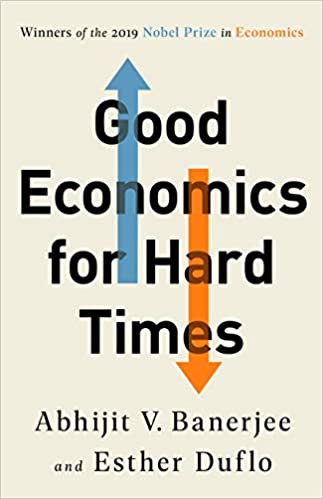The authors of “Good Economics for Hard Times“: Abhijit V Banerjee and Esther Duflo received the recent award of the Nobel Prize for their works in approaching today’s economic problems and challenges.
This book is a must-read, not just to have insights about economic research; but also to question the practices of the economy nowadays. One of the concerns for authors Abhijit Banerjee and Esther Duflo is that the ‘general public has stopped listening to economists about economics’.
A consequent objective of the book is to share the ‘useful expertise no one else has’. Ironically, the authors argue, questioning some of its fundamental tenets is what might allow economics to be ‘good’ for some of the most pressing challenges: rising xenophobia, climate catastrophe, The masterful weaving of narratives with evidence allows the authors to highlight what much of economics has ignored and only recently started to recognize—the dignity attached to work; the idea that individual preferences are not stables; the obsession with growth in policymaking, which, besides wrecking the planet, has also sidelined more fundamental questions of equity and justice. While disciplines like anthropology and public policy got there much earlier, the fact that these ideas are finding support from Nobel laureates will hopefully make them a whole lot As professionals, Banerjee and Duflo would like to see themselves as “plumbers”, working without any ideological positions, with the sole intention of fixing the world’s problems through evidence-based solutions. While the ethics of conducting experiments that carry the threat of leaving some participants ‘discouraged and working less’ need greater elaboration, the authors continue to be closely involved, globally, in testing policy instruments like cash transfers via field experiments. The debate between cash transfers and other instruments of social policy, such as MGNREGA ( Mahatma Gandhi National Rural Employment Guarantee Act ) or the Public Distribution System, is a lively one and one that rightly finds a despite acknowledging the role that economists have played in delegitimizing governments in the West, the authors do not exercise caution in running down governments (and other principles for that matter) in their enthusiastic advocacy of cash transfers in developing countries.
They consent to the position of MGNREGA among the poor and yet label the Indian experience of it unfavorably.
Their sweeping generalizations ignore the ‘evidence’ pointing to the diversity of experiences across Indian states in using instruments like an employment guarantee or a public distribution system. Glossing over the unfavorable evidence around cash transfers in the West, they simply argue that people in developed countries look to find meaning and identity in work while those in developing countries do not.
For researchers who are preoccupied with proofs, there is no evidence offered here. And even if someone found it to be true on average; how can He justify a policy like Universal Basic Income when He knows that it deprives people of their sense of self-worth. In their numerous field experiments among the poor, the authors would surely have met many individuals for whom work was not just about money but also about the dignity it brought with it.
You might want to specify in which position the authors stand, It can be confusing to know, that’s why you should apprehend this book with a curious and investigating mind.





